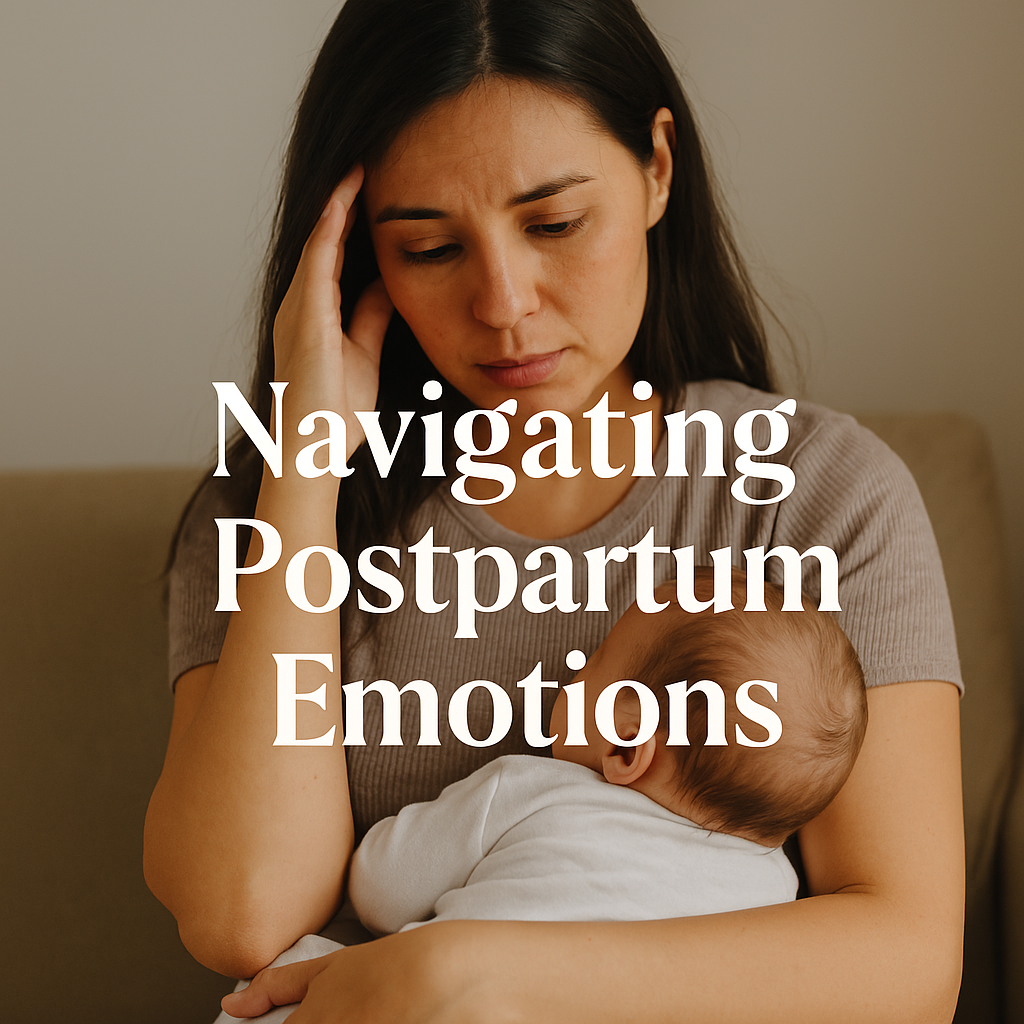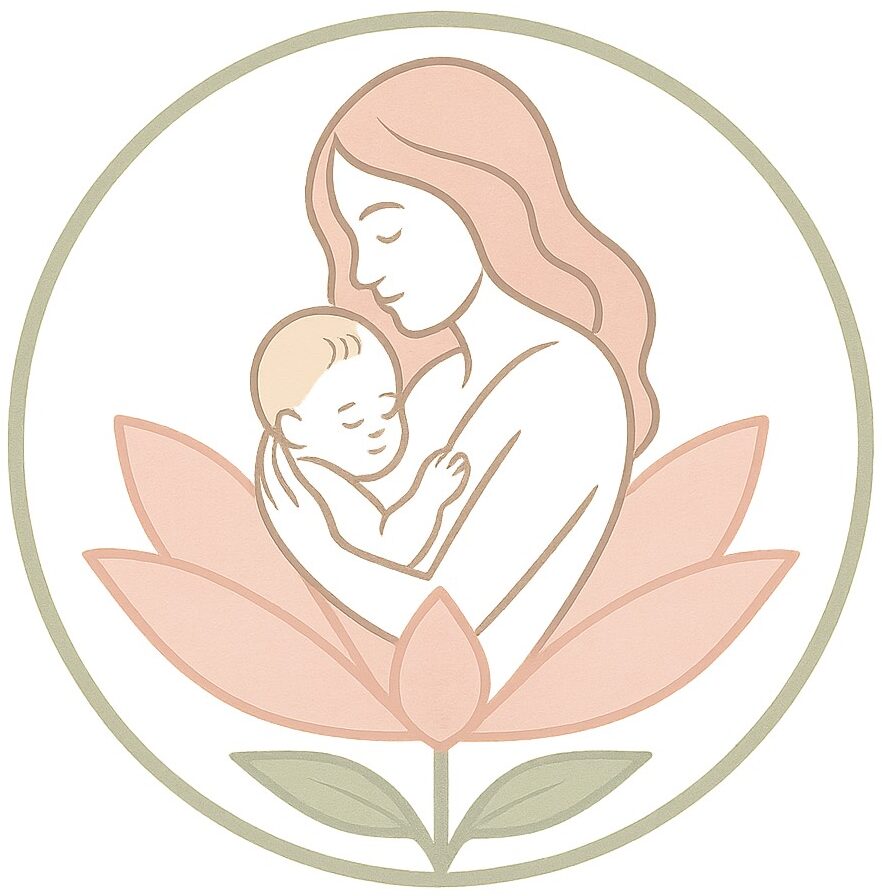
Giving birth changes everything, but emotionally, it’s not always what we expect. For many new moms, learning how to navigate postpartum emotions is the key to feeling like themselves again. If you’re struggling after birth, you’re not alone.
Bringing a baby into the world is supposed to be one of life’s happiest moments, but what happens when it’s not?
If you’re a new mom (or about to be), you’ve probably been told to expect sleepless nights and diaper blowouts. But what about the emotional rollercoasdter no one warned you ab out? The moments when you’re overwhelmed, anxious, or just plain sad for no reason? You’re not alone and you’re not broken.
Let’s talk about what really goes on emotionally after childbirth, why it happens, and how you can take care of your mental health in those raw, early weeks of motherhood.
Learning how to navigate postpartum emotions can make all the difference in your recovery and your confidence. This guide breaks down why you feel what you feel, and what to do about it.
Why Navigating Postpartum Emotions Is So Hard
Social media, baby showers, and well-meaning relatives tend to paint a glowing picture of new motherhood, rosy cheeks, soft lullabies, and instant joy. but for many women, the early days postpartum feel more like survival mode.
The truth? You can love your baby and still feel exhausted, lost, and emotionally drained. That doesn’t make you a bad mother. it makes you human.The Hormonal Whiplash
Right after childbirth, your body goes through a massive hormonal shift. Estrogen and pregesterone, which were sky-high during pregnancy, drop off a cliff. This sudden change affects your mood, energy, and even your ability to sleep.
As a result, most new moms (around 70-80%) experience what’s known as the “baby blues.” You might feel teary, irritable, anxious, or moody, often out of nowhere. This usually kicks in around day 3 or 4 and lasts up to two weeks.
The baby blues are common. They’re also temporary. But if those feelings linger or get more intense, it might be something more serious.
When It’s More Than Just the Blues
1. Postpartum Depression (PPD)
This affects about 1 in 7 mothers. It’s more than just feeling down, it can cloud everything.
Common signs:
- Persistent sadness or hopelessness
- Guilt or feeling like a bad mom
- Trouble bonding with your baby
- Sleep issues (even when the baby sleeps)
- Thoughts of self-harm or wanting to disappear
PPD can show up any time in the first year postpartum. It doesn’t mean you don’t love your baby. It means you need support and treatment, just like you would for any other health issue.
2. Postpartum Anxiety
Not as well-known, but just as real. Instead of sadness, this feels like panic, fear, or obsessive worry. You might constantly fear that something bad will happen to your baby or feel like you can’t relax, ever.
Signs to watch for:
- Racing thoughts
- Trouble sleeping even when tired
- Physical symptoms like nausea or a racing heart
- Feeling on edge all the time
3. Postpartum Psychosis (Rare but serious)
This affects 1–2 out of every 1,000 women. It comes on fast, usually within the first couple of weeks, and may include hallucinations, delusions, confusion, or paranoia. If you or someone close to you notices these signs, seek immediate medical help, this is a psychiatric emergency.
The Identity Earthquake
Even if you don’t develop a clinical condition, it’s completely normal to feel emotionally shaken. Becoming a mother changes everything, your body, your time, your relationships, your sense of self. That shift can come with grief, confusion, and even anger.
You may miss your freedom. Feeling invisible is common too. Some days you might even wonder where you went. These feelings are valid, and you don’t have to push them aside just because you’re “supposed to be happy.”
The Sleep Deprived Truth
Sleep isn’t just a luxury, it’s essential to your mental health. But with a newborn, sleep is the first thing to do. Waking up every few hours, night after night, can break even the strongest person down.
Lack of sleep is a major trigger for postpartum depression and anxiety. If you’re struggling emotionally, try to prioritise rest, even if that means asking someone to hold the baby while you nap.
Learning how to navigate postpartum emotions day by day can be the difference between surviving and thriving.
You don’t have to do it all. You just have to survive. The rest will follow suit later.
How to Navigate Postpartum Emotions (Day by Day) After Birth
Support is not optional, it’s a lifeline. Whether it’s your partner, your parents, a friend, or a postpartum doula, having help makes a huge difference. But here’s the catch: people might not know what you need unless you tell them.
“Every mom deserves tools to help navigate postpartum emotions with clarity and compassion.”
“You’re not alone in trying to navigate postpartum emotions—it’s more common than people think.”
How to ask for Support While Navigating Postpartum Emotions:
- “Can you hold the baby so I can shower and breathe?”
- “I need 30 minutes to nap, can you please keep watch?”
- “Please just listen. I don’t need advice right now.”
- “I’m not okay. Can you please help me make an appointment with someone?”
Also, don’t be afraid to tell your healthcare provider how you’re feeling emotionally. They want to know. Many now include mental health screenings as part of postpartum checkups.
You’re Not Alone
Shame is the biggest barrier to getting help.
But postpartum emotions are real, and more common than you think. Talking about them helps break the stigma and reminds others they’re not alone either.
There’s still a lot of shame around postpartum emotions. Many moms don’t talk about what they’re really going through. But the more we open up, the more we normalize the conversation.
Online support groups, therapy, and peer communities can be incredibly healing. Even just reading someone else’s story can make you feel less isolated.
You’re not weak. Being emotional doesn’t make you dramatic.
What you’re going through is a massive physical and emotional shift.
Therapy and Treatment Options
If you’re struggling, know this: help works. You don’t have to tough it out.
Options include:
- Talk therapy (especially CBT or postpartum-specific counseling)
- Medication, including antidepressants that are safe for breastfeeding
- Support groups (virtual or in-person)
- Mindfulness practices like journaling, breathing exercises, or guided meditations
- Basic self-care: hydration, sunshine, real meals, time outside, and saying no when needed
Final Thoughts on Navigating Postpartum Emotions with Compassion
Motherhood is not a test you have to pass. It’s a messy, emotional, real-life transformation. And like any major life change, it comes with growing pains.
So if you’re not okay right now? That’s okay.
Speak up. Ask for help. Cry if you need to. Take a nap. Eat something. Say no. Let go of the perfect picture and focus on one small win at a time.
You are doing enough. You are enough.
💬 Share Your Story
If this post resonated with you, or if you’ve gone through postpartum struggles yourself, drop a comment or send me a message. You never know who your words might help.
For more help, visit Postpartum Support International they offer free resources and support for new moms.
For personal reflection and healing support, explore Her Second Birth Journal—a space designed to help new mothers process postpartum emotions, https://hersecondbirth.com/her-second-birth-journal
